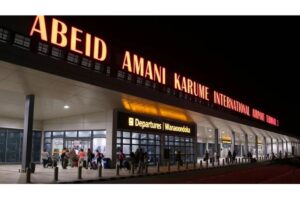When President Samia Suluhu Hassan took office, her easing of opposition restrictions was praised. But a recent protest crackdown shows that progress on political freedom under her leadership has been inconsistent.
A recent crackdown on opposition party activities in Tanzania has left many political observers and analysts concerned about the East African country’s democratic space and the lack of competitive politics.
Ahead of International Youth Day on Monday, police arrested prominent politician Tundu Lissu and four other officials from his Chadema party. Authorities had banned a youth rally organized by the party on Sunday, citing concerns that it would incite chaos and violence.
Those arrested were subsequently released on bail — but the incident seems to have cast a slur on Tanzanian President Samia Hassan’s promise to allow her political opponents to freely operate.
Tanzania’s constitition guarantees the liberties of citizens, granting them free speech and freedom to peacefully asssemble, but opposition politicians have hardly enjoyed this, Godwin Gonde Amani, a political analyst, told DW.
What is the issue?
“The problem comes to the definition of freedom of speech and how those in government want people to express themselves. And it has been seen that few people are enjoying more freedom than the others,” Amani said.
“The mass arrests and arbitrary detention of figures from the Chadema party, as well as their supporters and journalists, is a deeply worrying sign in the run-up to local government elections in December 2024 and the 2025 general election,” Amnesty International said in a statement.
A year ago, President Samia Hassan ended a ban on opposition rallies imposed by her strongman predecessor, John Magufuli.
She also promised to restore competitive politics in the country, a practice that had been absent during Magufuli’s presidency.
Inconsistent progresss
But progress hasn’t been consistent under Hassan’s leadership.
Beatrice Bandewa, a Tanzanian citizen resident in the Tanzanian capital Dar es Salaam, told DW that the president has demonstrated good faith so far and can’t be faulted for recent turn of events.
“In 2021 when President Samia came into power, she allowed all political activities to take place in the country, on condition that [political] parties observe rules and regulations,” she said.
Bandewa said that hasn’t been the case. “In any political demonstrations, not all partakers are in good will. Some are taking advantage of displayingn hate speech and inciting violence.”
Police reportedly cracked down on Monday’s planned rally because organizers had asked people to come out like the “youth in Kenya” — a reference to Gen-Z protests against Kenya’s now-scrapped finance bill which demonstrators said would raise taxes on already overtased Kenyan workers.
Kenyan President William Ruto refused to sign the Finance Bill 2024 into law following the significant public unrest and calls for his resignation.
William Maduhu, a Tanzanian who disagrees with the actions of the police said, the latest move points to a return to the dark days in Tanzania when opposition parties and their supporters faced significant crackdowns, arbitrary arrests and other forms of political persecution — particularly during Magufuli’s rule, which lasted from 2015 until his death in 2021.
“Those dark days of 17 years are like coming back,” he said as he expressed concerns about how other Tanzanians seem to be worried.
At a public event earlier this week, Emmanuel Nchimbi, the secretary general of Tanzania’s ruling center-left Chama Cha Mapinduzi (CCM), expressed concern about the actions of the police. He fears they could thwart efforts to reduce tensions between the opposition and the ruling party.
“Give us politicians the chance to address these matters through dialogue,” he said. “Not everything should be handled through legal channels. Some issues are inherently political.”
Achieving political reconciliation
Amani suggested that the recent crackdown could hinder reconciliation efforts aimed at reducing political tensions.
“A lot has been changing with the president compared to the previous times under President Magufuli and the other presidents,” the political analyst told DW.
“Now there are issues of reconcilation, there are issues of resolving the conflict between the opposition and the ruling party.”
Amani criticized the police and other governmental agencies for excessively exercising their powers and mandates in response to the potential replication of youth protests from Kenya and Nigeria in Tanzania.
“What happened in Nigeria and what happened in Kenya can affect any country and Tanzania has a lot to learn from it,” Amani said.
Bandawe said the recent crackdown shouldn’t be considered irrelevant since they only seem to prevent any act of violence ahead of the elections.
“As we know, this year the country is going for local government elections. This is the reason why the government organs are not allowing these political demonstrations and protests of any kind,” she said.
Human Rights Watch said in a report on Wednesday that Tanzanian police arbitarily arrested 375 members and supporters of the country’s main opposition party.
Amani said Tanzania must free up its democratic space and allow for divergent opinions and activities if it is to deepen its democratic system.
Tanzania must allow for “tolerance within the field of politics because people cannot think the same all the time,” he said.
“Using pressure or force trying to limit the [opposition] in exercising their freedom seems to be a threat towards sustainable peace.”
Edited by: Keith Walker
Source: allafrica.com














